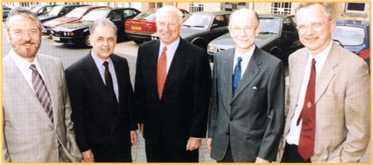| enginuity |
|
home | contents | previous | next |
A Top Move

Profs Andy Hopper (far right) and David Newland welcome the President of AT&T. David Nagel, the Chairman, C. Michael Armstrong and the Chief Scientist Sandy Fraser to the offices at Cambridge.
A world in which drink vending machines know how you like your coffee without being asked, and TV and radio systems select your favourite channels as you walk into a room seem like science fiction to most of us. Those researchers concerned with communications engineering, however, know that this is simply the future. More importantly, desks where computers, printers, phones and fax machines are not surrounded with a clutter of wire are all within our grasp. Professor Andy Hopper was appointed to the newly created chair of Communications Engineering in the Department of Engineering in 1997. At that time he was a Reader in Computer Technology in the Department of Computer Sciences, although he confesses to always being an engineer at heart.
Andy is one of a growing number of academics who manage to combine their lives in the University with commercial success. He founded his first company only two years after completing his PhD at Cambridge, and was a founding director of Acorn Computers, where he was involved in research leading to the production of the early BBC computers, the mainstay of many schools over the years. A few more start-ups later he is now Managing Director at AT&T Laboratories, Cambridge, based just across the road from the Engineering Department.
The allocation of laboratory and office space within a growing Department has always been a problem, but this is being overcome in the time honoured tradition by adding an extra floor, this time to the existing Baker building. Andy hopes to create a research group of 40-50 researchers once the laboratory space is available.
Working with businesses is an important aspect of developing communications technology, and Professor Hopper is no stranger to this. "There is plenty of backing for this type of research", he explains, "but we have to be realistic about the correct handling of intellectual property. The world is far more complex now, and we have to move away from the linear models of technology transfer that have been prevalent in the past, the way we work now is very circular between industry, the university and smaller spinoff companies. This makes for fantastic new opportunities."
For further information, contact Professor Andy Hopper: 01223 766516, e-mail: hopper@eng.cam.ac.uk
| number 8, December '99 | home | contents | previous | next |